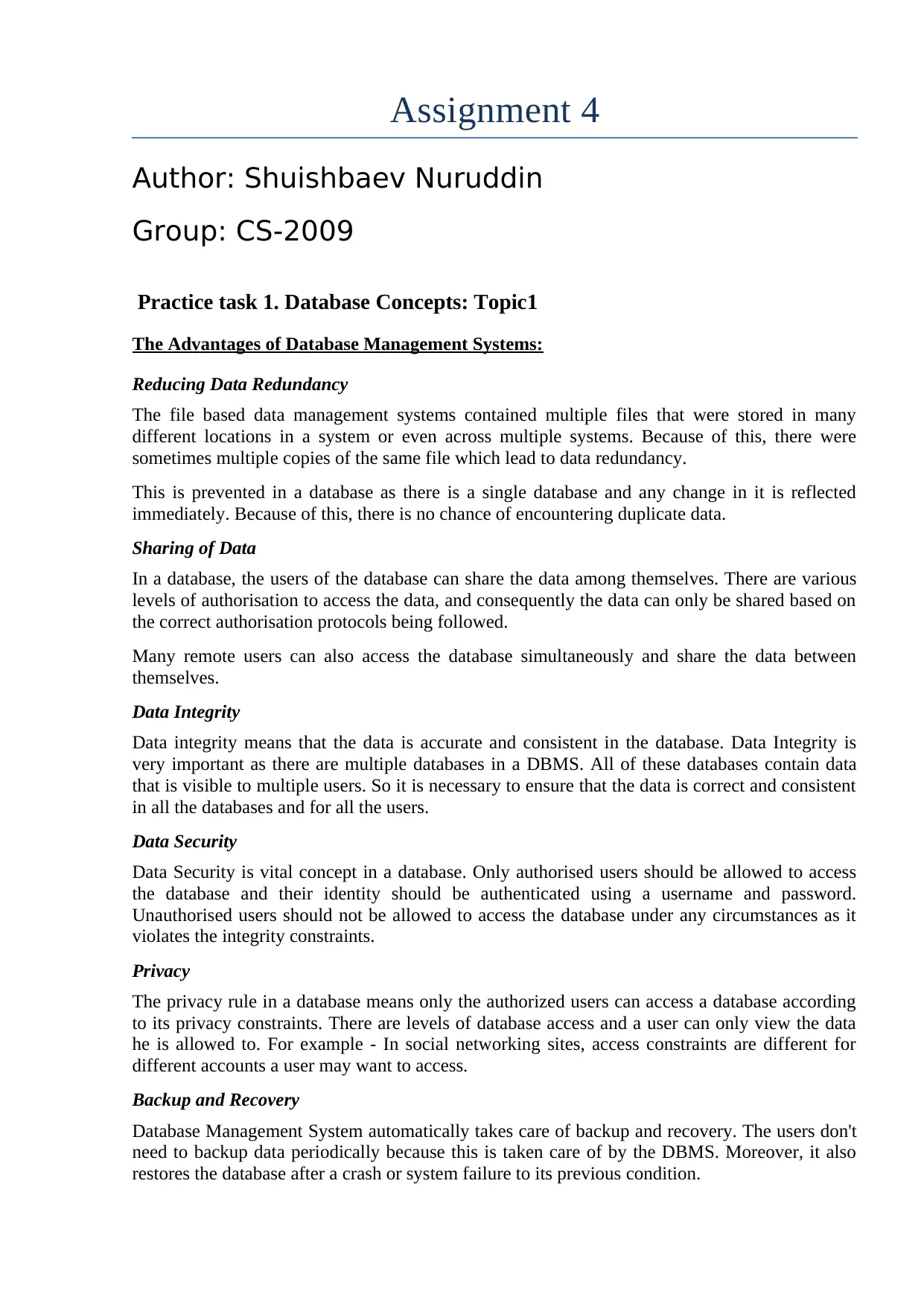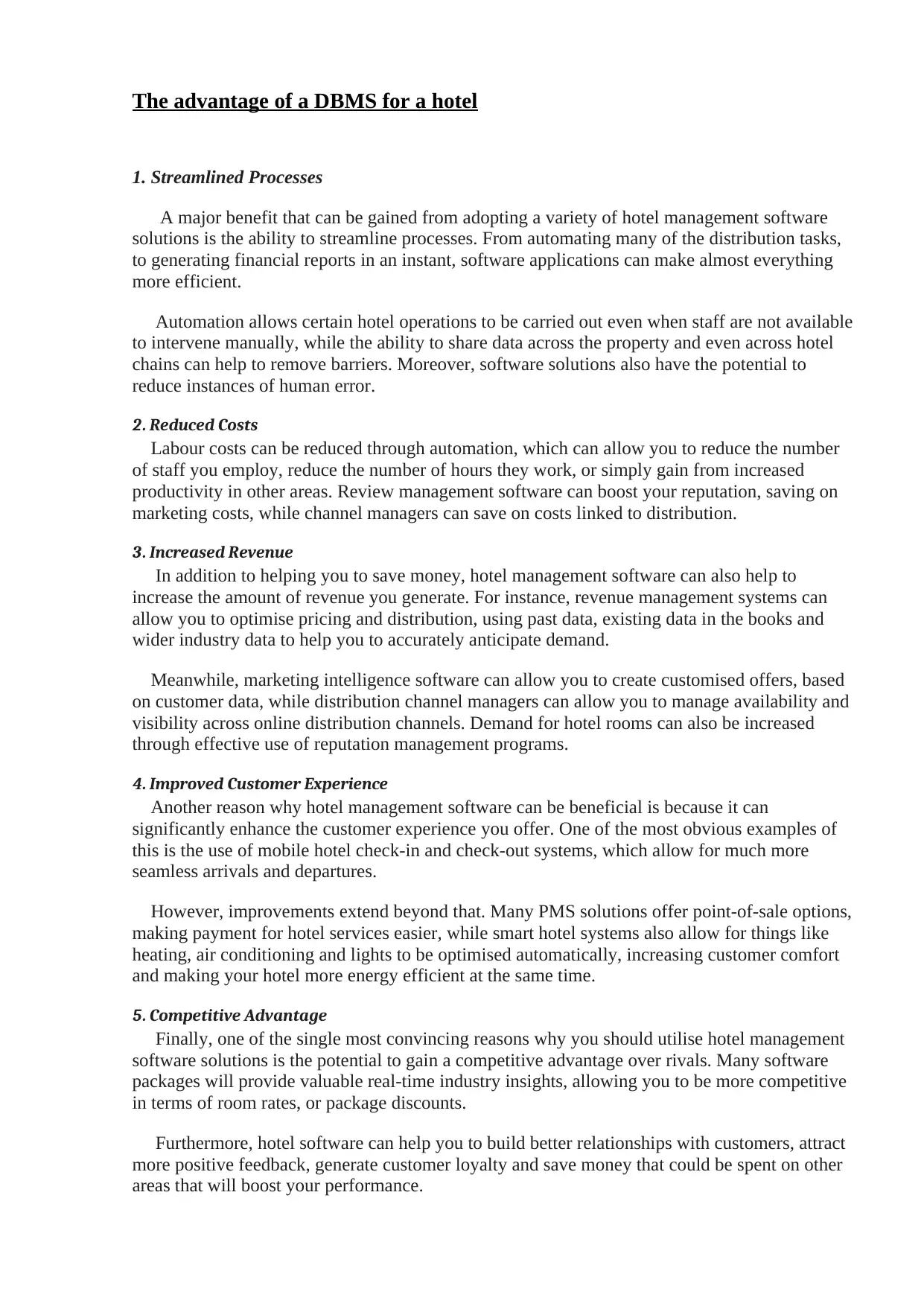CS-2009 Assignment 4: Database Concepts, DBMS and Hotel Applications
VerifiedAdded on 2020/10/12
|3
|906
|226
Homework Assignment
AI Summary
This assignment, authored by Shuishbaev Nuruddin, explores the advantages of Database Management Systems (DBMS). The first topic discusses key benefits such as reduced data redundancy, data sharing, data integrity, data security, privacy, and backup/recovery capabilities. The second topic delves into how a DBMS can benefit the hotel industry, outlining five key advantages: streamlined processes through automation, reduced costs via labor and marketing efficiencies, increased revenue through optimized pricing and distribution, improved customer experience with mobile check-in and smart systems, and a competitive advantage gained through real-time industry insights and customer relationship management. The assignment provides a comprehensive overview of the practical applications and benefits of DBMS in both general and industry-specific contexts.

Assignment 4
Author: Shuishbaev Nuruddin
Group: CS-2009
Practice task 1. Database Concepts: Topic1
The Advantages of Database Management Systems:
Reducing Data Redundancy
The file based data management systems contained multiple files that were stored in many
different locations in a system or even across multiple systems. Because of this, there were
sometimes multiple copies of the same file which lead to data redundancy.
This is prevented in a database as there is a single database and any change in it is reflected
immediately. Because of this, there is no chance of encountering duplicate data.
Sharing of Data
In a database, the users of the database can share the data among themselves. There are various
levels of authorisation to access the data, and consequently the data can only be shared based on
the correct authorisation protocols being followed.
Many remote users can also access the database simultaneously and share the data between
themselves.
Data Integrity
Data integrity means that the data is accurate and consistent in the database. Data Integrity is
very important as there are multiple databases in a DBMS. All of these databases contain data
that is visible to multiple users. So it is necessary to ensure that the data is correct and consistent
in all the databases and for all the users.
Data Security
Data Security is vital concept in a database. Only authorised users should be allowed to access
the database and their identity should be authenticated using a username and password.
Unauthorised users should not be allowed to access the database under any circumstances as it
violates the integrity constraints.
Privacy
The privacy rule in a database means only the authorized users can access a database according
to its privacy constraints. There are levels of database access and a user can only view the data
he is allowed to. For example - In social networking sites, access constraints are different for
different accounts a user may want to access.
Backup and Recovery
Database Management System automatically takes care of backup and recovery. The users don't
need to backup data periodically because this is taken care of by the DBMS. Moreover, it also
restores the database after a crash or system failure to its previous condition.
Author: Shuishbaev Nuruddin
Group: CS-2009
Practice task 1. Database Concepts: Topic1
The Advantages of Database Management Systems:
Reducing Data Redundancy
The file based data management systems contained multiple files that were stored in many
different locations in a system or even across multiple systems. Because of this, there were
sometimes multiple copies of the same file which lead to data redundancy.
This is prevented in a database as there is a single database and any change in it is reflected
immediately. Because of this, there is no chance of encountering duplicate data.
Sharing of Data
In a database, the users of the database can share the data among themselves. There are various
levels of authorisation to access the data, and consequently the data can only be shared based on
the correct authorisation protocols being followed.
Many remote users can also access the database simultaneously and share the data between
themselves.
Data Integrity
Data integrity means that the data is accurate and consistent in the database. Data Integrity is
very important as there are multiple databases in a DBMS. All of these databases contain data
that is visible to multiple users. So it is necessary to ensure that the data is correct and consistent
in all the databases and for all the users.
Data Security
Data Security is vital concept in a database. Only authorised users should be allowed to access
the database and their identity should be authenticated using a username and password.
Unauthorised users should not be allowed to access the database under any circumstances as it
violates the integrity constraints.
Privacy
The privacy rule in a database means only the authorized users can access a database according
to its privacy constraints. There are levels of database access and a user can only view the data
he is allowed to. For example - In social networking sites, access constraints are different for
different accounts a user may want to access.
Backup and Recovery
Database Management System automatically takes care of backup and recovery. The users don't
need to backup data periodically because this is taken care of by the DBMS. Moreover, it also
restores the database after a crash or system failure to its previous condition.
Paraphrase This Document
Need a fresh take? Get an instant paraphrase of this document with our AI Paraphraser

The advantage of a DBMS for a hotel
1. Streamlined Processes
A major benefit that can be gained from adopting a variety of hotel management software
solutions is the ability to streamline processes. From automating many of the distribution tasks,
to generating financial reports in an instant, software applications can make almost everything
more efficient.
Automation allows certain hotel operations to be carried out even when staff are not available
to intervene manually, while the ability to share data across the property and even across hotel
chains can help to remove barriers. Moreover, software solutions also have the potential to
reduce instances of human error.
2. Reduced Costs
Labour costs can be reduced through automation, which can allow you to reduce the number
of staff you employ, reduce the number of hours they work, or simply gain from increased
productivity in other areas. Review management software can boost your reputation, saving on
marketing costs, while channel managers can save on costs linked to distribution.
3. Increased Revenue
In addition to helping you to save money, hotel management software can also help to
increase the amount of revenue you generate. For instance, revenue management systems can
allow you to optimise pricing and distribution, using past data, existing data in the books and
wider industry data to help you to accurately anticipate demand.
Meanwhile, marketing intelligence software can allow you to create customised offers, based
on customer data, while distribution channel managers can allow you to manage availability and
visibility across online distribution channels. Demand for hotel rooms can also be increased
through effective use of reputation management programs.
4. Improved Customer Experience
Another reason why hotel management software can be beneficial is because it can
significantly enhance the customer experience you offer. One of the most obvious examples of
this is the use of mobile hotel check-in and check-out systems, which allow for much more
seamless arrivals and departures.
However, improvements extend beyond that. Many PMS solutions offer point-of-sale options,
making payment for hotel services easier, while smart hotel systems also allow for things like
heating, air conditioning and lights to be optimised automatically, increasing customer comfort
and making your hotel more energy efficient at the same time.
5. Competitive Advantage
Finally, one of the single most convincing reasons why you should utilise hotel management
software solutions is the potential to gain a competitive advantage over rivals. Many software
packages will provide valuable real-time industry insights, allowing you to be more competitive
in terms of room rates, or package discounts.
Furthermore, hotel software can help you to build better relationships with customers, attract
more positive feedback, generate customer loyalty and save money that could be spent on other
areas that will boost your performance.
1. Streamlined Processes
A major benefit that can be gained from adopting a variety of hotel management software
solutions is the ability to streamline processes. From automating many of the distribution tasks,
to generating financial reports in an instant, software applications can make almost everything
more efficient.
Automation allows certain hotel operations to be carried out even when staff are not available
to intervene manually, while the ability to share data across the property and even across hotel
chains can help to remove barriers. Moreover, software solutions also have the potential to
reduce instances of human error.
2. Reduced Costs
Labour costs can be reduced through automation, which can allow you to reduce the number
of staff you employ, reduce the number of hours they work, or simply gain from increased
productivity in other areas. Review management software can boost your reputation, saving on
marketing costs, while channel managers can save on costs linked to distribution.
3. Increased Revenue
In addition to helping you to save money, hotel management software can also help to
increase the amount of revenue you generate. For instance, revenue management systems can
allow you to optimise pricing and distribution, using past data, existing data in the books and
wider industry data to help you to accurately anticipate demand.
Meanwhile, marketing intelligence software can allow you to create customised offers, based
on customer data, while distribution channel managers can allow you to manage availability and
visibility across online distribution channels. Demand for hotel rooms can also be increased
through effective use of reputation management programs.
4. Improved Customer Experience
Another reason why hotel management software can be beneficial is because it can
significantly enhance the customer experience you offer. One of the most obvious examples of
this is the use of mobile hotel check-in and check-out systems, which allow for much more
seamless arrivals and departures.
However, improvements extend beyond that. Many PMS solutions offer point-of-sale options,
making payment for hotel services easier, while smart hotel systems also allow for things like
heating, air conditioning and lights to be optimised automatically, increasing customer comfort
and making your hotel more energy efficient at the same time.
5. Competitive Advantage
Finally, one of the single most convincing reasons why you should utilise hotel management
software solutions is the potential to gain a competitive advantage over rivals. Many software
packages will provide valuable real-time industry insights, allowing you to be more competitive
in terms of room rates, or package discounts.
Furthermore, hotel software can help you to build better relationships with customers, attract
more positive feedback, generate customer loyalty and save money that could be spent on other
areas that will boost your performance.

Topic2:
⊘ This is a preview!⊘
Do you want full access?
Subscribe today to unlock all pages.

Trusted by 1+ million students worldwide
1 out of 3
Related Documents
Your All-in-One AI-Powered Toolkit for Academic Success.
+13062052269
info@desklib.com
Available 24*7 on WhatsApp / Email
![[object Object]](/_next/static/media/star-bottom.7253800d.svg)
Unlock your academic potential
Copyright © 2020–2026 A2Z Services. All Rights Reserved. Developed and managed by ZUCOL.




